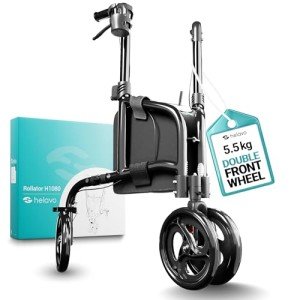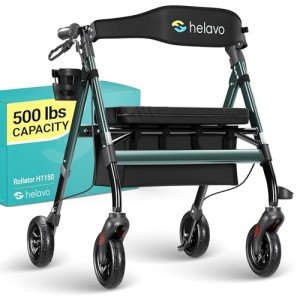What's The Current Job Market For Elderly Walker Professionals Like?
페이지 정보
작성자 James Cottrell 작성일 25-10-30 19:55 조회 3 댓글 0본문

The Importance of Elderly Walkers: Enhancing Mobility and Independence
As individuals age, their bodies undergo numerous changes that might affect their mobility. Conditions such as arthritis, osteoporosis, and other persistent disorders can make navigating the environment challenging for the elderly Walker. Thankfully, assistive devices like walkers can considerably boost mobility, ensuring that seniors keep their self-reliance and lifestyle. This post will look into the numerous kinds of walkers offered, their benefits, and important considerations when choosing the right one.

Understanding the Different Types of Walkers
A walker can provide the needed support for seniors having problem with mobility. Nevertheless, not all walkers are developed equivalent. Here's a detailed breakdown of the various kinds of walkers readily available.
| Kind of Walker | Description | Best For |
|---|---|---|
| Standard Durable Walker | A lightweight frame with four legs providing standard support. | Individuals needing assistance while walking. |
| Two-Wheeled Walker | A walker with 2 wheels at the front permitting easier movement. | Users who need more mobile support for faster walking. |
| Four-Wheeled Walker | A Bariatric Rollator Walker with four wheels, brakes, and a seat. | Active seniors who need more mobility and a location to rest. |
| Knee Walker | A specialized walker with a padded platform for resting the knee. | Individuals recovering from foot or ankle injuries. |
| Folding Walker | A walker that can be collapsed for easy storage and transportation. | Seniors needing benefit when traveling. |
Table 1: Types of Walkers
Advantages of Using a Walker
Walkers provide a plethora of benefits for seniors, consisting of:
- Enhanced Stability: Walkers offer extra support to the user, assisting to cultivate confidence while walking.
- Improved Balance: With a walker, seniors can rearrange their weight, enhancing balance and lowering the risk of falls.
- Increased Independence: Users can walk around their homes and neighborhoods more easily, allowing them to engage in social activities.
- Decreased Pain: Walkers can decrease the influence on joints and muscles, making movement less unpleasant for conditions like arthritis.
- Versatile Usage: Walkers appropriate for numerous environments, whether indoors, outdoors, or on uneven surface areas.
Table 2: Benefits of Using a Walker
Selecting the Right Walker
Selecting the Best Rollator Walker walker is essential to maximizing mobility and guaranteeing comfort. Here are some considerations:
- Weight Capacity: Ensure that the walker can support the user's weight. Many walkers have a defined weight limit.
- Height Adjustment: Adjustable height features guarantee that the walker is set to the appropriate level for the user's height, promoting great posture and comfort.
- Wheels vs. No Wheels: Depending on the user's capabilities and environment, a walker with wheels might be more beneficial for motion, while a non-wheeled walker might supply more stability.
- Additional Features: Some walkers feature built-in seats, storage, or accessories (like cup holders) that can enhance user experience.
Table 3: Considerations for Choosing a Walker
Upkeep of Walkers
Proper maintenance of walkers is vital for ensuring security and durability. Here are some standard upkeep tips:
- Regular Inspections: Check for cracks, rust, or loose screws and make sure that the rubber suggestions on the legs are intact.
- Wheel Maintenance: Ensure that wheels move easily and are not stuck; oil them if required.
- Changes: Periodically inspect if the height and settings remain correct, changing them as required to preserve user convenience.
Table 4: Maintenance Tips for Walkers
FAQs About Elderly Walkers
1. What is the typical expense of an elderly walker?
The rates of walkers can range substantially based on the type and features. Requirement walkers may cost in between ₤ 50-₤ 100, while specialty walkers or rollators can range from ₤ 100 to ₤ 300.
2. Are walkers covered by insurance?
Lots of insurance coverage strategies, including Medicare, cover the expense of walkers, provided they are deemed clinically required. It's vital to examine with your insurance company for specifics.
3. How do I understand when my enjoyed one needs a walker?
Indications might include trouble walking independently, frequent falls or near-falls, and increased tiredness while carrying out daily activities. A healthcare specialist can provide an extensive evaluation.
4. Can walkers be used outside?
Yes, numerous walkers can be used both indoors and outdoors. If preparing to use a walker outdoors, consider a model with wheels or larger legs for stability on different surfaces.
5. How long can a walker last?
With appropriate maintenance, a good quality walker can last for a number of years, though wear and tear will differ depending upon use frequency and conditions.
Walkers are invaluable tools that can bring back mobility and independence for seniors while ensuring their safety. As individuals live longer and lead active way of lives, investing in appropriate assistive devices like walkers is more vital than ever. Understanding the kinds of walkers offered, their benefits, and how to choose the right one can empower users and their caretakers to make educated options. Eventually, the ideal walker can result in improved quality of life, allowing aging individuals to remain active individuals in their communities.
- 이전글 The Main Issue With Order High-Quality Counterfeit Money, And How You Can Fix It
- 다음글 There's Enough! 15 Things About Buy Driver's License Without Advance Payment We're Tired Of Hearing
댓글목록 0
등록된 댓글이 없습니다.
